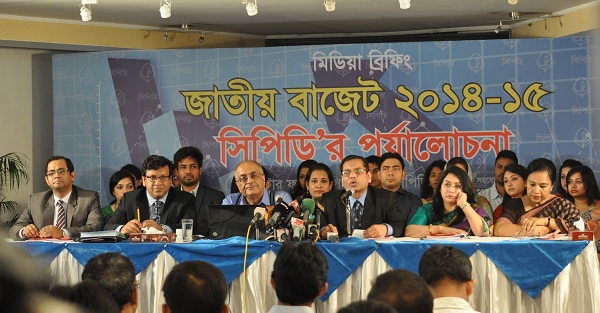Macroeconomic correlates in the proposed FY2015 budget were inconsistent while key fiscal targets did not reflect reality in designing of the framework.
The basis of achieving 7.3 percent GDP growth remains a suspect without substantial private sector investment which has shown a continuous declining trend, underscored the CPD analysis of the National Budget for FY2015.
The analyses flagged that fiscal measures in the budget are largely in order and tuned to budgetary objectives but not adequate to attain expected GDP growth.
CPD Distinguished Fellow Dr Debapriya Bhattacharya and Executive Director Professor Mustafizur Rahman presented the budget analyses on behalf of the CPD Independent Review of Bangladesh’s Development (IRBD) 2014 Team, during a media briefing at the Brac Centre Inn on Friday, 6 June 2014.
[box title=”Resources” color=”#333333″]An Analysis of the National Budget for FY2015Press Reports and Editorials on the briefing
The detailed analyses on the FY2015 budget covered medium term outlook, public finance framework, fiscal and sectoral measures, review of the social sectors, local government, district budget and economic reforms.
[/box]CPD identified that the FY2015 budgetary measures have objectives to attain fiscal consolidation backed up by high growth revenue; to revitalise economic growth momentum; to revert the downturn of investment and to further control inflation.
However, the FY2015 budget has not provided for necessary institutional reforms towards improved fiscal-budgetary management as well as supportive policy environment.
Analyses of the credibility of fiscal framework have shown that the most volatile components were domestic borrowing, ADP implementation and non-tax revenue.
The expectation as regards the utlisation of foreign aid to finance 71.3 percent incremental deficit was considered unusual according to CPD analysis.
Analyses pointed out that allocation for agriculture and allied sectors; education and health sectors as percentage of GDP; ADP projects concerning development of children; and the real value of allowance under social safety net programmes (SSNP) are declining every fiscal year.
CPD proposed establishing an Agricultural Price Commission to ensure fair prices of agricultural commodities on an urgent basis to ensure incentive price for the producers while maintaining market stability.
CPD researchers also felt the necessities for economic reforms including implementation and oversight capacities and also establishment of an Independent Statistical Commission to validate the Macroeconomic correlates; a Local Government Financing Commission and a Public Expenditure Review Commission.
Implementation of the newly proposed green tax measures and effective measures to restrict capital flight were emphasised during the briefing.
CPD researchers maintained that the continued scope of whitening black money contradicts the revised strategies for revenue collection and this cannot be supported.
During the Q&A session, lead contributors of the budget analyses CPD Research Director Dr Fahmida Khatun, Additional Research Director Dr Khondaker Golam Moazzem and Research Fellow Mr Towfiqul Islam Khan, also Coordinator of the CPD IRBD 2014 Team, responded to a number of queries from journalists.


